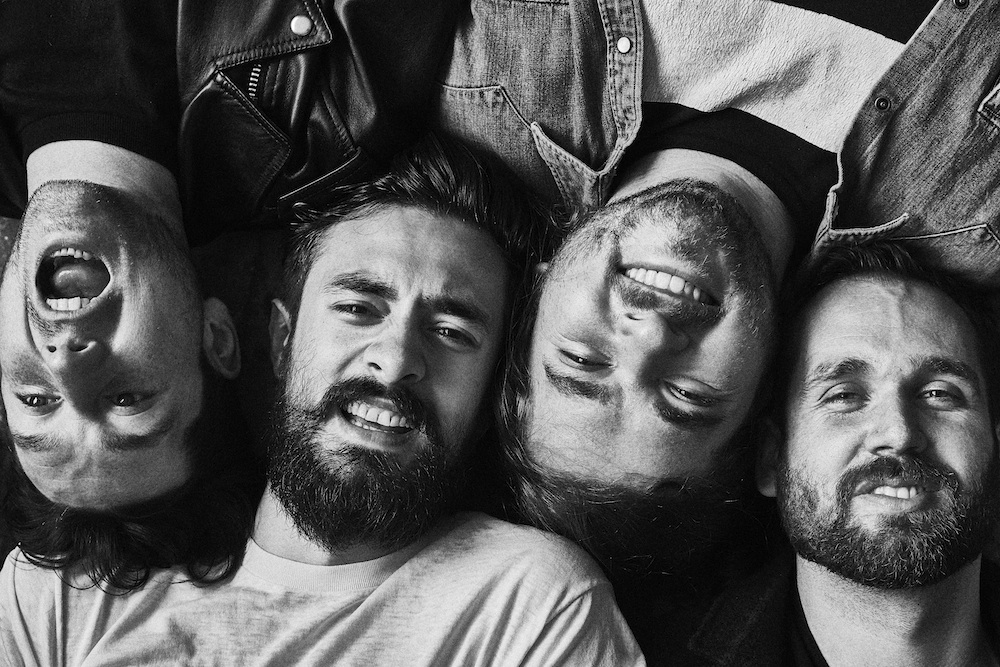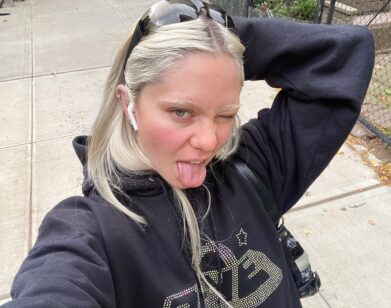Bastille
BASTILLE IN NEW YORK, AUGUST 2016. CLOCKWISE FROM TOP RIGHT: DAN SMITH, CHRIS WOOD, WILL FARQUARSON, AND KYLE SIMMONS. PHOTOS: CHRISTIAN ANWANDER/HONEY ARTISTS. STYLING: JOSHUA LIEBMAN/HONEY ARTISTS. HAIR: WILLIAM SCHAEDLER USING LIVING PROOF. MAKEUP: MIRIAM ROBSTAD USING MAC COSMETICS.
BASTILLE began with perhaps the simplest, most romantic of musical formats: the mixtape. It was 2012, and they covered recent radio classics (such as Corona’s 1993 single “The Rhythm of the Night”) and fused them with samples from famous films (Psycho, Donnie Darko). The result was a two-volume mixtape titled Other People’s Heartache, and while that garnered attention online, the following year was when the group experienced great change. They released their original debut album Bad Blood, and were catapulted into radiowave replays (“Pompeii” was on the Billboard Hot 100 for eight weeks in 2014) and years of touring, which continues to this day.
Thankfully, the band—which consists of Will Farquarson, Kyle Simmons, Dan Smith, and Chris “Woody” Wood—has remained true to its roots. Their second LP Wild World (Virgin Records), which was released last Friday, sees them return to sampling, embracing the format that gave them their start. “We wanted to use spoken word that’s sampled from films, documentaries, and TV shows to help weave the album together, because it’s meant to play out like a mixtape,” Dan Smith explains. “It jumps around sonically quite a lot and genre wise … so it gives it this sort of collage texture.”
While the British four-piece were in New York this summer, we spoke to them about Wild World (both the album and their whirlwind surroundings), their fan favorite cover (TLC’s “No Scrubs”), and their trips to CERN and NASA.
HALEY WEISS: Did your last album have any guitar?
DAN SMITH: No, we didn’t have any on the last one.
WILL FARQUARSON: I’ve played guitar for years, and wanted to play guitar, but we got halfway through the last one and realized we hadn’t used any. It became a bit of a challenge to make an album that is essentially quite alternative sounding, and has a lot of sounds that could be guitar—for instance on “Overjoyed,” there’s what sounds like guitar but is actually a lot of keys. For that album, it was a bit of a challenge to do it, so it was quite nice to get an opportunity to introduce on the second album something a bit fresh for us. For the rest of the world, perhaps it’s not, because guitar is quite ubiquitous, but for us it’s exciting to just have guitar on the record.
SMITH: I guess the guitar, like Will said, is kind of a novelty for us. We wanted this album to feel different from the first one, like a different set of work, and that allowed us to push what we do within the realms of BASTILLE in another direction—in the same way that the more hip-hop leaning production also pushed the album.
WEISS: Beyond your producer Mark Crew, is there a particular person or set of people that when you first make a song, or when you put an album together, you think, “Okay, I want them to listen to it before I make final decisions.”
KYLE SIMMONS: 90 percent is us and Mark. We have a great team behind us, but I think they know us well enough that they know we know what were doing; Dan’s got the creative path that we all kind of follow, and that’s why we work well. We were talking to people recently who have their A&R and their management team in the studio all of the time, and we don’t. We’re really lucky. It’s a good working environment because they know and they trust us creatively. They know that we can just let Dan write a song by himself and then come together, put parts on it, and make the right decisions basically.
SMITH: There’s definitely a couple of people I’ll play stuff to when it’s nearly finished just to see what they think. Mark, our producer, his wife is Australian and just listens to the radio—she’s awesome—and I guess is quite a casual music listener. So he’s always like, “Has it passed [her] test?” Everybody has their barometer. It was really interesting, I had people at my house and played a couple of [songs] for my friends from uni—who I imagine didn’t listen to our first album that much—but wanted to hear a bunch of tracks from the new one. I played it and it was quite nice. One was like, “Oh, fuck. I’d listen to this.” [laughs] I was like, “Oh, thanks, mate. That’s a massively backhanded compliment but thanks.”
FARQUARSON: I find my girlfriend to be a good barometer because she’s not very interested in me or the band. [all laugh] So if she likes something, it must be kind of good. I don’t think I’ve heard her listen to our music and we’ve been together for about three years.
WEISS: So someone who’s vaguely disinterested is a good person to test it on.
SMITH: Yeah. It’s nice how little she cares! It’s quite endearing.
WEISS: I read that you recorded this album in the same studio you recorded the first album in.
SMITH: Kind of—we did some recording in a bigger studio in London where we all went as a band, and did the live drums and all of that stuff, and we also did bits and bobs in tour buses, on the road, and in hotel rooms. That was fun, because it was very different, but every time we came back to London I’d go into the studio everyday, over the last couple of years, and there was a point at the beginning of this year—January, February, March—where we were sort of going in every day, I guess to self-curate and finish everything that we’d done. That’s always been our process; sometimes they come together in a half hour and [snaps] are finished straight away, and others are sort of there and just being worked on in the back of our minds for sometimes a year.
WEISS: When performing live, is there a particular song that has surprised you? Something that people really connected to?
SMITH: There’s a song called “Snakes” on the album that we started playing last summer, because we were really excited about it and got impatient, and I remember there were some shows last summer where people were going nuts and jumping up and down to the song they hadn’t heard before, which is quite exciting for us. It’s quite a rousing/depressing song, as is all of our music. … Playing new songs at festivals is weird, obviously. People at festivals are always a bit drunk, and probably just want to hear stuff they know by bands they love, or are checking you out and don’t know your stuff very well.
CHRIS WOOD: I think that when people don’t want to play their older, well-known songs, it’s quite selfish. You’re only at that point in your career because of previous songs, so I think it would be quite selfish to not [play them].
SMITH: We’ve got a song called “Pompeii” and people ask us all of the time if we’re bored of playing it, but it’s really fucking fun. We’re in this incredibly lucky position where we get to play sometimes to tens of thousands of people in a field somewhere and at that point in the set, it’s really exciting. Getting to see people be excited by something that you made in a little computer is really fucking cool.
WEISS: How did the album’s title, Wild World, come about?
SMITH: There are a bunch of reasons. It came from a song on the record called “Warmth,” and it sort of felt like it summed up a lot of what the record is about, which is exactly what it says it is. Also, I just really like the idea of our albums and our releases having these alliterative, two word titles, so they’re part of a collection, like different movies by the same director. They’ll all hopefully, if we get to do more work, fit together.
FARQUARSON: It kind of limits what we can call the albums but—
SIMMONS: But I think that’s a good thing. It’s really difficult being given absolutely anything on the spectrum, it’s infinite, so I think now that we’ve set this thing it’s going to be loads easier. It’s a lot more specific.
WOOD: Led Zeppelin did that, with Led Zeppelin I, Led Zeppelin II, Led Zeppelin III, Led Zeppelin IV.
WEISS: Do you guys get homesick? You haven’t been home much with all of the touring.
SIMMONS: Home is not our house. The concept is all of our friends and family, of course we miss them, but I guess we were generally a bit older—other bands get signed when they’re super young and they grow up in this industry—but even if you forget age, we had all established life at home before things got crazy and we started traveling around. That was difficult.
SMITH: Being on tour is awesome, and we are very lucky to be able to do it, but the way that it sometimes it feels is like FOMO, but life FOMO. We get to travel, and we obviously all hang out with each other and our crew are really, really good friends of ours, so there’s nothing negative about it, but you come home after a few months and obviously everybody’s lives have moved on. I get FOMO if my mates just go to the pub and I can’t go, so imagine that times every day for a long time. It’s a weird thing to do—to be in a band. If we were pushed to say that there’s something negative about it, I think it’s just that, it’s missing home—not even home, like Kyle said, it’s friends and family and stuff like that.
SIMMONS: And some people combine their [tour life with] home, whereas we have almost two different lives. We go out and we do all this stuff, but when we go back home we each have our own groups of friends and family and we hang out with them, and when we go away we have this. With other people we’ve met, it’s all a big blur.
FARQUARSON: I guess it’s interesting traveling, for me, because I never in my life until doing this felt a sense of being from anywhere particularly, whereas now I do feel quite European. Even if we don’t get up to England, if we’re in France or somewhere like that, it feels more like going back somewhere familiar—more than even America, where we share a lot of cultural stuff. It’s amazing, I love it [here], but it does feel like I’m away from home.
WEISS: Do you still sing “No Scrubs”?
WOOD: Loads.
SMITH: All of the time! Oh my god, we love playing that tune. It’s so much fun to play and see people’s faces that haven’t heard that we’ve done a cover it, and are like, “Are they doing this? They’re doing this!” A year ago, there was a festival in Atlanta, and actually the remaining members of TLC got in touch with our management to say how much they loved it and for a very short while they were going to come.
SIMMONS: Chili was going to come, but she didn’t end up making it in the end. Her son came. We were this close [holds fingers close together] to performing with Chili on stage, which was the most devastating feeling when she couldn’t make it.
SMITH: It’s quite surreal for us to have done that, and with other covers out there and mash-ups that we did, to then a year or so down the line hear from the people themselves to say that they like it—or don’t. We did a remix with David Lynch, who is a film director I absolutely adore, and he ended up loving it and invited me ’round his house to hang out and have coffee.
WEISS: That’s a peak cool moment. I don’t know if you’ll ever be cooler than that.
SMITH: That was definitely the coolest two hours of my life. It was one of those really weird things. The mixtapes, and a lot of our music, is comes from a place of fandom and appreciation and of respect and of nodding toward stuff that we feel really affectionate towards. It’s indescribably bizarre when the train of events then leads those who inspired you initially to being a real person in front of you. … Some of our best experiences over the last years have come from these opportunities. Playing live and getting to tour, we’re so lucky, but some of the other experiences that have come from being in the band, like being invited to go on a private tour of NASA or CERN….
FARQUARSON: There’s nothing cooler than someone explaining to you, as if it was easy, how they create antimatter. And they kept saying things like, “Well obviously you know that…” [laughs]
SMITH: At the beginning of the trip we were like, “Treat us on this tour like you would treat a two-year-old who can’t quite talk yet.”
SIMMONS: And terrifyingly, I think they were.
WEISS: But it still wasn’t enough?
SIMMONS: It wasn’t enough at all. [laughs]
SMITH: It’s such a mad privilege to go somewhere like that. … And getting to meet the head of Cape Canaveral, who walks into the room like, “Hey, I’ve been in space four times. Do you have any questions about space?”
SIMMONS: “The Enterprise or Millennium Falcon?” That was the first one—just get that out of the way.
FARQUARSON: I like how much he liked that question as well.
SIMMONS: He was like, “Guys, obviously it’s the Millennium Falcon.” [all laugh]
WEISS: I think those are all of the questions I have for you. Is there anything else that you wanted to mention?
SIMMONS: Recycle—that’s really important.
WILD WORLD (VIRGIN RECORDS) IS OUT NOW. FOR MORE ON BASTILLE, VISIT THEIR WEBSITE.







